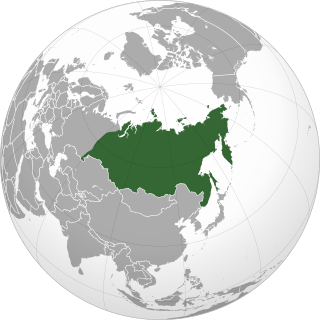Siberian means pertaining to Siberia.
Siberian may also refer to:
- Siberians, demonym for residents of Siberia, as well as the Russian sub-ethnic group
- Siberian (cat), cat breed
- Paleo-Indians
- Tungusic peoples
Siberian means pertaining to Siberia.
Siberian may also refer to:

Siberia is an extensive geographical region comprising all of North Asia, from the Ural Mountains in the west to the Pacific Ocean in the east. It has formed a part of the sovereign territory of Russia and its predecessor states since the centuries-long conquest of Siberia, which began with the fall of the Khanate of Sibir in the late 16th century and concluded with the annexation of Chukotka in 1778. Siberia is vast and sparsely populated, covering an area of over 13.1 million square kilometres (5,100,000 sq mi), but home to roughly a quarter of Russia's population. Novosibirsk, Krasnoyarsk, and Omsk are the largest cities in the area.
Tura may refer to:

The Siberian is a centuries-old landrace of domestic cat in Russia, and recently developed as a formal breed with standards promulgated the world over since the late-1980s. Since 2006, the breed is recognised for registry and championship status with all major cat registries.
Anabasis is an expedition from a coastline into the interior of a country. Anabase and Anabasis may also refer to:
The name Sibir can refer to:
Anjou may refer to:
Ice Maiden may refer to:
Siberia is the region of Russia and northern Kazakhstan between the Ural Mountains and the Pacific Ocean.

A large minority of people in North Asia, particularly in Siberia, follow the religio-cultural practices of shamanism. Some researchers regard Siberia as the heartland of shamanism.
Maral may refer to:
Siberian languages may refer to any languages spoken in Siberia, including:
Sibirsky (masculine), Sibirskaya (feminine), or Sibirskoye (neuter) may refer to:
West Siberian can refer to:
L. sibirica may refer to:
Kolyma is a vast region in Siberia, Russia.
Tatar language a Turkic language spoken by the Volga Tatars mainly in modern Tatarstan, Siberia and Crimea.

The Consolations of the Forest: Alone in a Cabin on the Siberian Taiga is a 2011 book by the French writer Sylvain Tesson. Its French title is Dans les forêts de Sibérie, which means "in the forests of Siberia". It recounts how Tesson lived isolated for six months, from February to July 2010, in a cabin in Siberia, on the northwestern shore of Lake Baikal. An English translation by Linda Coverdale was published in 2013.
Paleoamerind or Paleo-Amerind may refer to:
Russian Expeditionary Force may refer to:
Niemirówka may refer to: